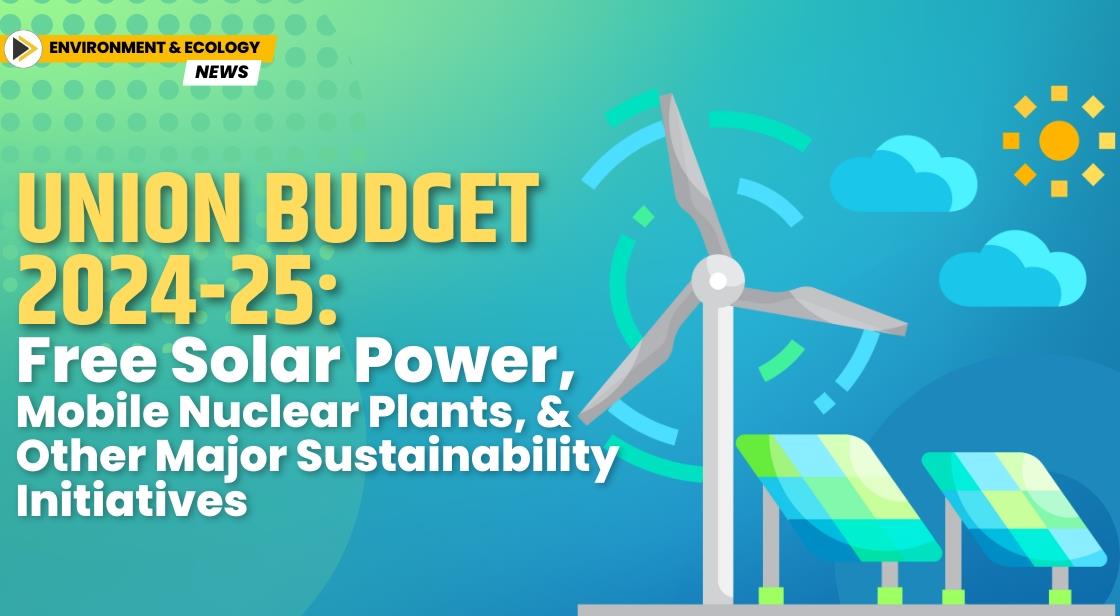Union Budget 2024-25: Free Solar Power, Mobile Nuclear Plants, and other major sustainability initiatives

News Synopsis
India's Union Budget for 2024-25, presented by Finance Minister Nirmala Sitharaman, prioritizes energy security and a sustainable future. The government's strategy focuses on ensuring readily available energy resources, affordability for all citizens, and cost control to minimize economic strain. Let's delve into the key initiatives:
Sunlighting Homes and Saving Money: PM Surya Ghar Muft Bijli Yojana
This flagship program aims to install rooftop solar panels in 1 crore (10 million) households, providing up to 300 units of free electricity per month. The scheme has already garnered significant interest, with over 1.28 crore registrations and 14 lakh applications received.
Pumping Up Renewables: Policy Focus on Energy Storage
A new policy promoting pumped storage projects will be introduced to enhance electricity storage capabilities and integrate more renewable energy sources like wind and solar power into the grid. These projects are crucial for managing the intermittent nature of renewable energy production.
Going Nuclear: Embracing New Technologies
Recognizing the importance of nuclear energy in India's energy mix, the government plans to invest in new technologies, including partnering with the private sector to develop and deploy Bharat Small Modular Reactors (SMRs). These mobile, flexible, and factory-built reactors offer a smaller footprint and faster construction times compared to conventional nuclear reactors, leading to significant cost savings.
Supercharging Efficiency: Advanced Ultra Super Critical Thermal Power Plants
The Budget highlights the successful development of indigenous technology for Advanced Ultra Super Critical (AUSC) thermal power plants. These highly efficient plants will be established through a joint venture between National Thermal Power Corporation (NTPC) and Bharat Heavy Electricals Limited (BHEL). The initiative includes government support for fiscal needs and aims to boost domestic production of high-grade steel and advanced metallurgical materials.
From Efficiency to Emissions: A Shift for Hard-to-Abate Industries
A significant shift is planned for industries with high carbon footprints. The government will transition these industries from energy efficiency targets to stricter emission reduction targets. This will be regulated through the Indian Carbon Market, replacing the current 'Perform, Achieve and Trade' (PAT) scheme.
Cleaning Up the Small Scale: Energy Audits and Support for Traditional Industries
To promote cleaner energy usage and efficiency in traditional micro and small industries (MSMEs), the government will conduct energy audits in 60 clusters, including brass and ceramics. Financial assistance will be provided to help these industries switch to cleaner energy sources and implement energy-saving measures. This initiative will be expanded to cover 100 additional clusters in the next phase.
Quoting Sameer Jain, Managing Director at Primus Partners: MSMEs consume roughly 50% of the nation's power but generate over 75% of greenhouse gas emissions. Additional support, such as climate financing, will be crucial for MSMEs to adapt to the green revolution, especially considering the budget's commitment to helping them grow and compete globally.
Cultivating Resilience: High-Yielding Climate-Smart Crops
To enhance agricultural productivity and adaptation to climate change, the government will introduce 109 high-yielding and climate-resilient varieties of 32 field and horticultural crops. This initiative includes research funding for both public and private sectors.
Boosting Green Technologies: Minerals for the Future
The budget proposes exemptions and reductions in customs duties for 25 critical minerals like cobalt and lithium, crucial for green technologies. This move aims to bolster domestic manufacturing of batteries and other components essential for electric vehicles and renewable energy technologies.
Guiding the Green Path: Development of a Climate Taxonomy
A new climate taxonomy will be developed to guide India's green transition. This framework will ensure that investments and policies align with the goal of reducing carbon emissions and promoting sustainable practices.
You May Like









